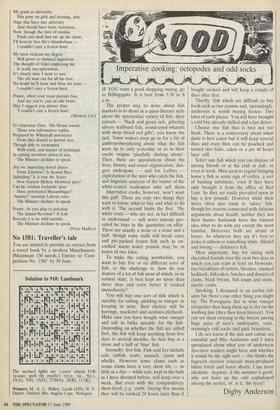a Imperative cooking: octopodes and odd socks
IF YOU want a good shopping outing, go to Billingsgate. It is best from 5.30 to 8 a.m.
The proper way to write about fish markets is to drool in a quasi-literary style about the spectacular variety of fish, their colours — 'black and green eels, gittering silvery scabbard fish, round-eyed whatsits with deep blood red gills'; you know the lark. Some writers even go in for a bit of anthropomorphising about what the fish were up to only yesterday or so in their exotic origins 'playfully darting about'. Then, there are speculations about the lives, history and social organisation, dan- gers undergone — and for Lefties exploitation of the men who catch the fish, and linguistic analyses of the banter of the white-coated tradesmen who sell them.
Imperative cooks, however, won't want this guff. There are only two things they want to know; what to buy and what to do with it. The second limits the first. The white coats — who are not, in fact difficult to understand — will serve anyone pro- vided he buys in the quantities on offer. These are usually a stone or a stone and a half, though some stalls will break cases and pre-packed frozen fish such as un- cooked warm water prawns may be in boxes of two kilos.
To make the outing worthwhile, you want to buy five or six different sorts of fish, so the challenge is: how do you dispose of a lot of fish most of which, in its natural state, is best kept no more than three days and even better if cooked immediately?
You will buy one sort of fish which is suitable for salting, pickling in vinegar or keeping in wine. Best choices will be herrings, mackerel and sardines-pilchards. Make sure you have bought wine vinegar and salt in bulks suitable for the fish. Depending on whether the fish are salted first, the fish will keep anything from five days to several months. So first buy is a stone and a half of 'blue' fish.
Secondly: live fish. Fish sold live include eels, catfish, crabs, mussels, clams and whelks. However some clams such as venus clams have a very short life — as little as a day — while eels, kept in the bath as I have directed before, will keep over a week. But even with the comparatively short-lived, „e.g. crabs, buying live means they will be cooked 24 hours later than if bought cooked and will keep a couple of days after that.
Thirdly: fish which are difficult to buy fresh such as raw prawns and, increasingly, anchovies is worth buying frozen. Two kilos of each please. You will have brought a cold box already chilled and a fast driver.
Choose one fish that is best not too fresh. There is a controversy about when skate is best eaten but it will keep several days and even then can be poached and turned into balls, cakes or a pie 48 hours later still.
Select one fish which you can dispose of among friends or at the club or pub, or even at work. Men seem to regard bringing home a fish as some sign of virility, a sort of hunting substitute, even if they have only brought it from the office or Red Lion. So they are easily prevailed upon to buy a few pounds. However while their wives often also claim to 'adore' fish, though for reasons connected with dubious arguments about health, neither they nor their hunter husbands have the faintest idea what to do with any except the most familiar. Moreover both are afraid of bones. So whatever they say it's best to make it salmon or something white, filleted and boring — children's fish.
Most important, buy for eating with cherished friends over the next two days in which you can cram at least six blowouts: two breakfasts of oysters, bloaters, smoked haddock, fish cakes; lunches and dinners of clams, black bream, fish soups and stews, smelts, crabs. . . .
Smoking, I discussed in an earlier Col- umn but there's one other thing you might try. The Portuguese like to wine vinegar octopodes then hang them up to dry on the washing line (they then keep forever). You can see them swaying in the breeze among huge pairs of men's underpants, vests, seemingly odd socks and pink brassieres.
I do not know if the size and colour are essential and Mrs Anderson and I have speculated about what sort of underwear Spectator readers might have and whether it would be the right sort — she thinks the fogeyish exterior conceals mass-produced bikini briefs and boxer shorts: I am more idealistic. Anyway, if the summer is good, why not hoist up the odd cephalopod among the aertex, or, is it, the lycra?
Digby Anderson


















































 Previous page
Previous page